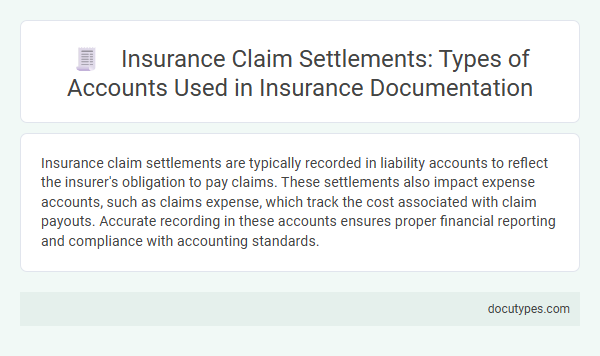Insurance claim settlements are typically recorded in liability accounts to reflect the insurer's obligation to pay claims. These settlements also impact expense accounts, such as claims expense, which track the cost associated with claim payouts. Accurate recording in these accounts ensures proper financial reporting and compliance with accounting standards.
Introduction to Insurance Claim Settlements
| Introduction to Insurance Claim Settlements | |
|---|---|
| Definition | Insurance claim settlements are payments made by an insurance company to a policyholder or third party to cover losses incurred as per the insurance policy terms. |
| Purpose of Claim Settlements | To reimburse or compensate You for damages, losses, or liabilities covered under Your insurance policy. |
| Types of Accounts Recording Insurance Claim Settlements | |
| Claims Payable | Liability account that records the amount an insurer owes to claimants before settlement. |
| Claims Expense | Expense account that tracks the cost of claims paid out during the accounting period. |
| Reinsurance Recoverable | Asset account showing amounts recoverable from reinsurers related to claim settlements. |
| Cash or Bank | Asset account reflecting settlement payments made to policyholders or claimants. |
| Reserve for Claims | Liability account estimating future claim settlements anticipated by the insurer. |
Overview of Insurance Documentation
What type of accounts record insurance claim settlements? Insurance claim settlements are typically recorded in claims payable accounts and loss reserve accounts. These accounts track the insurer's liabilities and the anticipated costs related to claims.
Key Accounts in Insurance Claim Settlements
Insurance claim settlements are recorded in specific financial accounts to ensure accurate tracking and reporting. These key accounts reflect the financial impact of claims on an insurance company's books.
- Claims Payable Account - Records the liability for claims that the insurer is obligated to pay.
- Claims Expense Account - Captures the cost of insurance claims as expenses during the reporting period.
- Reinsurance Recoverable Account - Tracks amounts recoverable from reinsurance companies for paid claims.
Your understanding of these accounts helps in analyzing how claim settlements affect an insurer's financial position.
Policyholder Account and Its Role
Insurance claim settlements are primarily recorded in the policyholder account, which tracks all transactions related to claims and premiums. This account ensures accurate documentation of claim payouts and adjustments, maintaining transparency between the insurer and insured. Your policyholder account plays a vital role in managing claim settlements and reflecting the financial impact on your insurance coverage.
Claims Payable Account Explained
Insurance claim settlements are recorded in specific liability accounts that track the amounts owed by the insurer. The claims payable account is a key component in managing these settlements and reflects the insurer's obligation to pay claimants.
Claims payable account explained focuses on how insurance companies document and manage pending claims efficiently while ensuring accurate financial reporting.
- Claims Payable Account - This liability account records the amounts the insurer owes to policyholders or third parties for approved insurance claims.
- Outstanding Claims - Claims payable represents unsettled claims that the company expects to pay based on reported incidents.
- Financial Reporting - Accurate claims payable balances are essential for reflecting the insurer's current liabilities on financial statements, helping you understand the company's financial position.
Reserve for Claims Account
Insurance claim settlements are recorded primarily in specific accounts that track liabilities and expenses related to claims. The Reserve for Claims Account is a key account used to estimate and manage the costs associated with settled and pending insurance claims.
- Reserve for Claims Account - Records the estimated liabilities for claims that insurance companies expect to pay.
- Claims Payable Account - Tracks the actual amounts owed to policyholders after claims are settled.
- Claims Expense Account - Captures the costs incurred by the insurer for claims during a given period, reflecting the financial impact on your insurance operations.
Reinsurance Recoverable Account
Insurance claim settlements are typically recorded in various accounts to accurately reflect the financial impact on the insurer. One crucial account for this purpose is the Reinsurance Recoverable Account, which tracks amounts recoverable from reinsurers on paid claims.
The Reinsurance Recoverable Account ensures that your company recognizes the portion of claim settlements that reinsurers will cover. This account plays a vital role in managing financial statements by separating direct insurer liabilities from recoverables under reinsurance agreements.
Premium Receivable and Receipts Accounts
Insurance claim settlements are recorded primarily in Premium Receivable and Receipts accounts. These accounts track the amounts due from policyholders and the payments received for claims.
Premium Receivable accounts capture the outstanding amounts that policyholders owe for their insurance premiums. Receipts accounts record the actual cash inflows when claim settlements are paid. Your accurate management of these accounts ensures clear financial reporting and claim processing.
Outstanding Claims Account
Insurance claim settlements are primarily recorded in the Outstanding Claims Account. This account tracks the liabilities related to claims that have been reported but not yet fully settled.
Your insurance company uses the Outstanding Claims Account to monitor pending payments and ensure accurate financial reporting. It helps maintain transparency in claim processing and financial obligations.
What Type of Accounts Record Insurance Claim Settlements? Infographic

